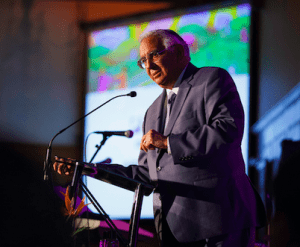 If Jesus was prophetic then the church that follows him is prophetic.
If Jesus was prophetic then the church that follows him is prophetic.
That means, first, that the church listens to, is empowered by and is confident in the Spirit of God. Johnson: “The prospect is at once thrilling and frightening.” Why? If we as a/the church learn to listen to the Spirit, we have to do what the Spirit directs us to do. We lose control.
Do we really believe the Spirit guides? Or do we say the Spirit guides — but through Scripture — so that in effect the Spirit is captured and contained by the Bible? Do you think the Spirit moves us beyond the Bible?
Luke Timothy Johnson’s new book Prophetic Jesus, Prophetic Church examines what Luke-Acts says about the Spirit with eloquent clarity.
Johnson develops about seven themes and then sketches what Spirit-prophecy means for the church today. I begin with his themes:
1. We need to avoid thinking of “Spirit” in Luke-Acts in terms of later Trinitarian theology.
2. The dominant characteristic of Spirit in the NT is “power” (eg., Rom 1:4; 1 Cor 2:4, etc).
3. Spirit refers to the Spirit who was promised and now is fulfilled.
4. Jesus’ childhood is filled with Spirit stuff (read Luke 1-2). All the characters in these chps are filled with the Spirit: Zechariah, Elizabeth, Mary, Jesus, John, Simeon, Anna.
5. Jesus’ ministry is filled with the Spirit — Luke 4:1, 14, 18-19 …
6. The disciples are prepared with the Spirit.
7. Acts is loaded with Spirit descriptions, from Luke 1 and Luke 2 on.
What about today?
1. Reality is shaped by the power of God at work every moment. God continues to disclose in our world — if we are faithful to Luke-Acts. We need to learn from the charismatic and pentecostal dimensions of the church — where Spirit shapes what happens. What this means is radical: we answer to the activity of the Spirit of God in the church today, and not just to (or even to) institutions and traditions.
2. God’s preferred mode of communication in the Bible is the prophetic voice. From Moses to Samuel to David to Elijah and Elisha … to Jesus and the apostles and others.
Are we willing to recognize the voice of the prophet today? Will we be scandalized by the particular person, as was the contemporaries of Jesus and John and the apostles, or will we see God speaking even through fallible humans? Will we recognize that God often speaks outside our expected circles?
3. Theology becomes not so much protection of tradition but listening to the Spirit. It can’t be “systematic” (his expression); the Spirit continues to speak. In Acts, God speaks through human experiences (see Zecharaiah, Mary, Peter); the Spirit leads to new insights into the Bible (Peter and Joel; eunuch and Isaiah).
4. Church: the issue is if the church is listening to the Spirit. Institutional forms are challenged, but that’s not the whole issue. It’s about total dedication to responding to the call of God in our world — and cultivation of the gifts of the Spirit.















